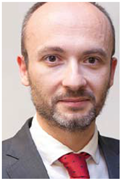Budget cut is opportunity to improve skills – Estradas de Portugal
Though the crisis has resulted in the need to cut legal spend, it represents an opportunity for in-house teams to develop their internal expertise, says João Canto e Castro
The economic crisis has forced Estradas de Portugal (EP) – the body responsible for managing the nation´s roads – to cut back on its legal spend, according to the company´s concessions legal director João Canto e Castro. However, he says that the reduction in resources has actually presented EP´s legal team with an opportunity to develop its own expertise particularly in the areas of litigation and arbitration, where Canto e Castro argues that EP´s strategy of doing litigation work internally identifies the team as fairly remarkable. In addition to the cut to its legal services budget, EP also faces the challenge of having to deal with a new regulator for its sector.
“We don´t have the budget to outsource all legal issues so we have to improve the capacity in our internal legal department,” Canto e Castro says. “We don´t have the budget to pay what private sector organisations can pay law firms.” But it was not always this way. Before the onset of the legal crisis, EP usually outsourced any litigation work, for example, but that has now changed. “We do litigation internally, which is rather extraordinary – it would have normally been outsourced in the past, but we can´t now because of the cost, but also because we have to improve our skills in the in-house team.” There are three people in EP´s concessions in-house team, which was created in 2008. Canto e Castro says the aim now is to improve the way the in-house team works – and progress has been made in this respect. “We´re much better organised,” he says. “We´re more focused on problem solving, we´re more practical and less theoretical.”
Tenders ´not necessary´
What work does EP outsource? “We only outsource in special cases,” says Canto e Castro. “Usually complex issues that require full time attention or project finance issues.” Canto e Castro says he is not authorised to say which firms EP uses and says that to do so would be public demonstration of EP´s preferences. However, it is understood that EP often outsources work to Sérvulo & Associados, which is recognised as one of the leading firms in Portugal for public law matters. In the past, EP would organise tenders where it would invite three or four firms to pitch for work, though these were not public tenders. Now Canto e Castro approaches firms it wants to use directly when there is a need to outsource. “There is no sense in launching a competitive process – having confidence in the firm is essential, but this is my personal view, not EP´s” In general though, EP now does, in general, most of its legal work internally, Canto e Castro adds.
So what work is currently occupying the EP legal team? Mainly problems relating to the legal management of seven PPP road contracts, according to Canto e Castro. “The matters are generally public-law related, but there are some commercial and financial issues,” he adds. “We are also providing legal support to three public and competitive tenders concerning works contracts in addition to litigation and arbitration work.”
New regulator
Canto e Castro says one of the biggest challenges facing the EP legal team is improving its skills. With the reduced budget for legal services, there is a greater emphasis on the team developing its litigation and arbitration expertise.. In addition, the Portuguese Government has introduced a new regulator of the sector, the Autoridade da Mobilidade e dos Transportes (AMT), which will take over responsibility for regulating Portuguese roads in September this year. “Until now we didn´t have a true regulator,” says Canto e Castro. “This is the first regulator that will look at how the road network is managed.”
Canto e Castro says the involvement of the new regulator will mean the way the sector is regulated will change remarkably because AMT is totally independent from the Government “We will be even more concerned with regulation and compliance,” he says. Canto e Castro adds that the legal team will be increasing its work in the coming year. “We will have opportunities to improve our arbitration and skills expertise.” He adds that it would be unlikely that such an opportunity would exist in the private sector. “In the private sector, you deal more with external law firms,” he says.
João Canto e Castro is concessions legal director at Estradas de Portugal











